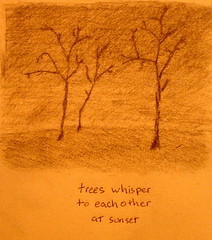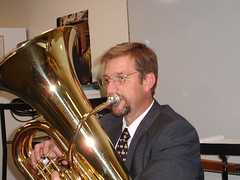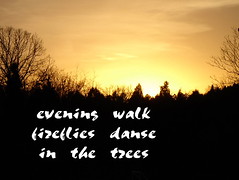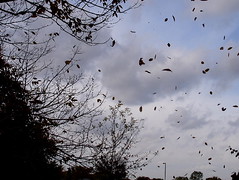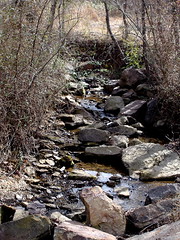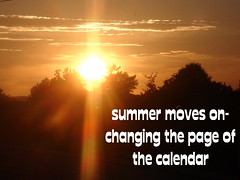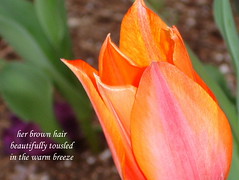Interviewed by Nasra Al Adawi
Proofread by Abs
J. Andrew Lockhart’s resolve for his poetic words comes through by using haiku. The Haiku is originally a poetry form which originated from Japan. Traditionally Haiku goes in to 5-7-5 syllables. I think if one gets into Haiku and uses an articulate sense of expressing the emotion through it, then this, to me, is the ultimate level of poetry, as it is not an easy way to express poetic thoughts just through three lines and able to pour emotion and images within the restriction of these lines. Andrew Lockhart had chosen the method of writing Haiku as his trump and here he shows us why he chose this hardest form of poetic writing.
What is Haiku to you? Some of us are not aware of Tanka or Haiga. Can you explain a bit about them?
Tanka, that were first called waka, began in Japan around the 9th century. They were written in five lines with 5-7-5-7-7 syllables. Their themes were personal and emotional, such as love, sadness or memories. Usually, the first three lines make a statement and the last two may go to another direction of the same theme.
In the 17th century, a new form of poetry grew from the tanka. This one, haiku, was made popular by the poet Basho (1644-94). Haiku are written in three lines in 5-7-5 syllables. Unlike tanka, haiku aren’t based on emotion, rather on a specific moment of time in nature. Haiga are haiku with a picture. Another form with the same structure is the senryu, which is usually humorous and isn’t necessarily based on nature.
How did you come around in expressing your self in Haiku?
My knowledge of haiku was based only on elementary school exercises of counting syllables on three lines of 5-7-5. I found out, though, that to more keep the “feel” of Japanese poetry, the syllables weren’t strict at all. English, structured so differently than Japanese, can make a haiku too cumbersome when one has to add words and rearrange lines to fit a 5-7-5 rule. The modern method, though, looks for the least amount of syllables rather than a specific amount of syllables. Tankas are treated the same way.
“
breeze-
spirits rise for more air
as leaves join
”
warmth from the sun
held down against the ground
by the late night clouds
the moon and stars are seen
only with my eyes closed
held down against the ground
by the late night clouds
the moon and stars are seen
only with my eyes closed
J. Andrew Lockhart’s resolve for his poetic words comes through by using haiku. The Haiku is originally a poetry form which originated from Japan. Traditionally Haiku goes in to 5-7-5 syllables. I think if one gets into Haiku and uses an articulate sense of expressing the emotion through it, then this, to me, is the ultimate level of poetry, as it is not an easy way to express poetic thoughts just through three lines and able to pour emotion and images within the restriction of these lines. Andrew Lockhart had chosen the method of writing Haiku as his trump and here he shows us why he chose this hardest form of poetic writing.
What is Haiku to you? Some of us are not aware of Tanka or Haiga. Can you explain a bit about them?
Tanka, that were first called waka, began in Japan around the 9th century. They were written in five lines with 5-7-5-7-7 syllables. Their themes were personal and emotional, such as love, sadness or memories. Usually, the first three lines make a statement and the last two may go to another direction of the same theme.
In the 17th century, a new form of poetry grew from the tanka. This one, haiku, was made popular by the poet Basho (1644-94). Haiku are written in three lines in 5-7-5 syllables. Unlike tanka, haiku aren’t based on emotion, rather on a specific moment of time in nature. Haiga are haiku with a picture. Another form with the same structure is the senryu, which is usually humorous and isn’t necessarily based on nature.
How did you come around in expressing your self in Haiku?
My knowledge of haiku was based only on elementary school exercises of counting syllables on three lines of 5-7-5. I found out, though, that to more keep the “feel” of Japanese poetry, the syllables weren’t strict at all. English, structured so differently than Japanese, can make a haiku too cumbersome when one has to add words and rearrange lines to fit a 5-7-5 rule. The modern method, though, looks for the least amount of syllables rather than a specific amount of syllables. Tankas are treated the same way.
“
the classroom
at night
echoes with voices
of children
now grown
at night
echoes with voices
of children
now grown
”
You are a music teacher and a poet. Of course to be a music teacher, you have to be musician yourself to be able to transfer the emotion of music to those you teach. Is there a linking point between the music that you teach and the poetry that you write? When you write the music tunes connect with your poetic instincts?
Poetry and music are both emotional, so I guess there is a connection. I rarely think of one while doing the other. There are exceptions, though, such as:
Chopin etude
at an art exhibition
as back ground-
cold fingers create
their own form of beauty
syncopation-
downspout rattling
in winter rain
Nature plays a big role in writing Haiku, where do you gain your inspiration in writing Haiku?
Poetry and music are both emotional, so I guess there is a connection. I rarely think of one while doing the other. There are exceptions, though, such as:
Chopin etude
at an art exhibition
as back ground-
cold fingers create
their own form of beauty
syncopation-
downspout rattling
in winter rain
Nature plays a big role in writing Haiku, where do you gain your inspiration in writing Haiku?
I would say that more than 90 percent of my work is written while I’m sitting outside, regardless of the weather. Nature is in front of me when I’m writing, so you can’t ignore it.
Who is J. Andrew Lockhart beyond Haiku?
I’ve lived most of my life in Van Buren, Arkansas (U.S.), which is a fairly small town next to the Arkansas River. I’ve been in many cities in many countries, but I’ve always felt that I belong here.
I attended the University of Arkansas from 1984 to 1991, receiving a Bachelor in Arts (music) and a Juris Doctor. In 1996, after practicing law for five years, I had a hemorrhagic stroke. That was followed by four years of rehabilitation, re-learning how to talk, walk, read and write.
Who is J. Andrew Lockhart beyond Haiku?
I’ve lived most of my life in Van Buren, Arkansas (U.S.), which is a fairly small town next to the Arkansas River. I’ve been in many cities in many countries, but I’ve always felt that I belong here.
I attended the University of Arkansas from 1984 to 1991, receiving a Bachelor in Arts (music) and a Juris Doctor. In 1996, after practicing law for five years, I had a hemorrhagic stroke. That was followed by four years of rehabilitation, re-learning how to talk, walk, read and write.
In 2001, I began as a Spanish teacher at an elementary school. The next year I started as the music teacher, as well. I’m still doing that and can’t imagine doing anything else.
Family is also a very important thing to me. We have four children – James (11), Katie (5), Hannah (2) and John (4 months). Needless to say, our house is never quiet.
Summer
“
In August, Summer demands our attention.
When the evening comes, she refuses to leave.
Being a visitor, she once again wears out her welcome.
By September, we are delirious, thinking that she'll never leave,
But then, she slams the door on her way out.
In October I'll miss her.
”
Do you think Haiku can just be simple poetry? Can the emotion and images be portrayed through Haiku as similar to poetry?
I definitely think that emotion and images can be shown in haiku and tanka – especially in tanka. When a writer is passionate about his work, emotion pours out of it, whether it is a tanka or a legal brief.
Family is also a very important thing to me. We have four children – James (11), Katie (5), Hannah (2) and John (4 months). Needless to say, our house is never quiet.
Summer
“
In August, Summer demands our attention.
When the evening comes, she refuses to leave.
Being a visitor, she once again wears out her welcome.
By September, we are delirious, thinking that she'll never leave,
But then, she slams the door on her way out.
In October I'll miss her.
”
Do you think Haiku can just be simple poetry? Can the emotion and images be portrayed through Haiku as similar to poetry?
I definitely think that emotion and images can be shown in haiku and tanka – especially in tanka. When a writer is passionate about his work, emotion pours out of it, whether it is a tanka or a legal brief.
“
breeze-
spirits rise for more air
as leaves join
”
Do you find poets are facing many challenges with openness towards use of internet
The internet is a wonderful world of freedom for poetry. You can say what you want, whether it’s good or bad. In other words, your work is exposed to the entire world and you don’t have to go through waiting whether a submission is accepted. Also, you can spend hours reading poetry that you would never find in your library or a book store.
“
leaf hardened
from the sun-
wanting to go home
”
It seems recently you have also taken to photography ? Tell us more about this ?
The internet is a wonderful world of freedom for poetry. You can say what you want, whether it’s good or bad. In other words, your work is exposed to the entire world and you don’t have to go through waiting whether a submission is accepted. Also, you can spend hours reading poetry that you would never find in your library or a book store.
“
leaf hardened
from the sun-
wanting to go home
”
It seems recently you have also taken to photography ? Tell us more about this ?
* I don’t consider myself a “photographer,” but I have fallen in love with photography. The biggest reason for this is the digital camera. In the past, I never was interested in cameras, mainly due to the cost of developing them, not to mention the time I had to wait for them. I can now take a photo, put it on the computer and have it on the internet within minutes – for free. You can’t beat that!
My photo blog was started due to the amount of extra photos that I had when I was making some for haiga. It’s nice to have a place to put them.
Where can we find your poetry? Book and website...
My main blog is Past Tense ( http://jamesalockhart.blogspot.com/ ). My photos are seen on Present Tense ( http://vanburendailyphoto.blogspot.com/ ). On Past Tense, there is a list of the other places where my work has been published.
It’s been mentioned that your published work is renowned? How did it all begin? Is there any criteria that we can use in writing Haiku. Of those of us who would like to ultimately publish our work what is your word of advice that can help us in that process? Please give us some tips that others can follow to be able to gain acceptance from poetry organizations?
The best way to learn how to write a haiku or a tanka is to read what others have written. It’s important to be familiar with the history of the forms and to spend some time reading works from the past. It’s just as important, I think, to read works by contemporary poets. All of this is easily found on the internet.
My photo blog was started due to the amount of extra photos that I had when I was making some for haiga. It’s nice to have a place to put them.
Where can we find your poetry? Book and website...
My main blog is Past Tense ( http://jamesalockhart.blogspot.com/ ). My photos are seen on Present Tense ( http://vanburendailyphoto.blogspot.com/ ). On Past Tense, there is a list of the other places where my work has been published.
It’s been mentioned that your published work is renowned? How did it all begin? Is there any criteria that we can use in writing Haiku. Of those of us who would like to ultimately publish our work what is your word of advice that can help us in that process? Please give us some tips that others can follow to be able to gain acceptance from poetry organizations?
The best way to learn how to write a haiku or a tanka is to read what others have written. It’s important to be familiar with the history of the forms and to spend some time reading works from the past. It’s just as important, I think, to read works by contemporary poets. All of this is easily found on the internet.
There are many pleases on the internet where your poetry can be submitted. Whether it’s published, though, is up to the editors. When you spend some time reading works that have been published at a website, you get an idea of what they are looking for. I don’t write things just to be published, though. I look through works that I have done and see if there’s something that would have a better chance.
It’s important, though, to not be discouraged if your work isn’t published. Even though the editor may not chose your work, that work is your voice and is just as important to you as anything that has been published. You can be influenced by other people’s work, but only you can understand your feelings and what you’re looking for.
“
writing alone
late at night—listening
to far away
traffic going west
and east
”
Poetry and ambitions, where do these two fall together?
I’m always trying to improve my writing, so that is a form of ambition. Also, I do have a dream of having a collection of my work published. I have actually put it together and have started to look for a publisher.
Does your poetic ambition have a horizon? Where do you want to go with your Haiku poetry?
Right now, I’m having so much fun that I can’t imagine not doing it. Time changes, though, so who knows what’s ahead.
“
moonlight
reflects from the roof
at midnight
”
“
writing alone
late at night—listening
to far away
traffic going west
and east
”
Poetry and ambitions, where do these two fall together?
I’m always trying to improve my writing, so that is a form of ambition. Also, I do have a dream of having a collection of my work published. I have actually put it together and have started to look for a publisher.
Does your poetic ambition have a horizon? Where do you want to go with your Haiku poetry?
Right now, I’m having so much fun that I can’t imagine not doing it. Time changes, though, so who knows what’s ahead.
“
moonlight
reflects from the roof
at midnight
”
*(All photos presented in here are the work of J. Andrew Lockhart’s, please click the photos to view some other collections of his)

